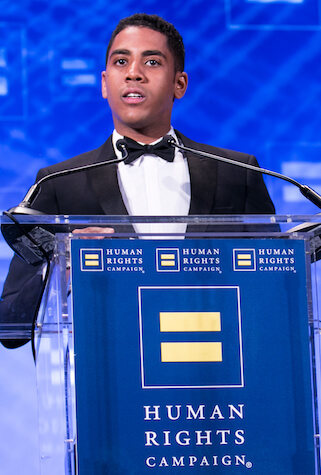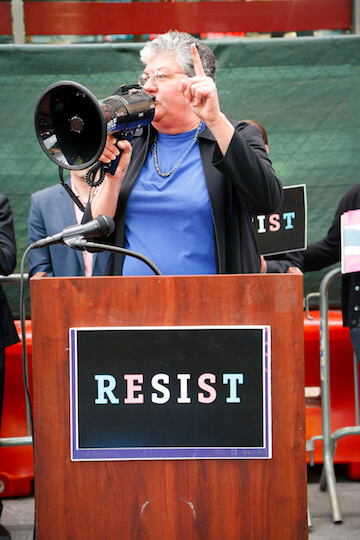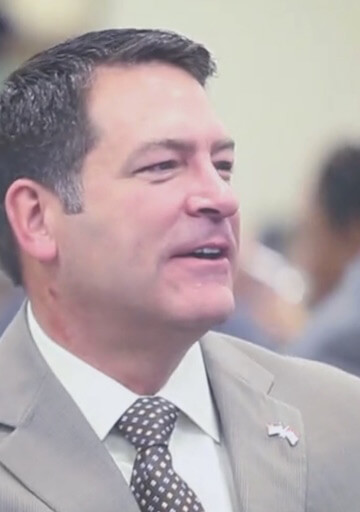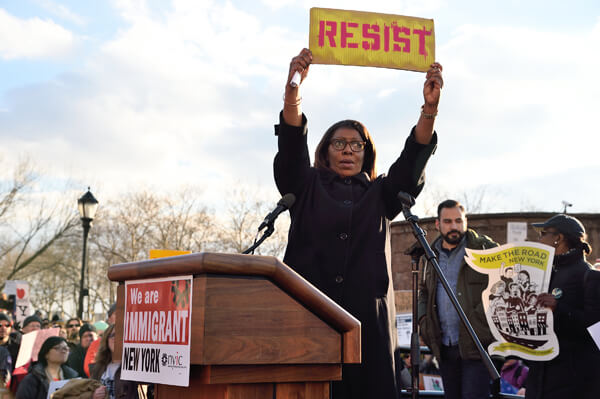COVER PHOTO BY DAVID GOODMAN/ HUMAN RIGHTS CAMPAIGN –– DESIGN BY MICHAEL SHIREY
BY PAUL SCHINDLER | In the middle of a passionate and powerful rejoinder to President Donald Trump – with whom she’s been at war since her Golden Globes speech in early January – Meryl Streep did something remarkable even for a much-decorated actor who has repeatedly proven her musical chops.
Before a packed Waldorf Astoria ballroom audience attending the February 11 annual Human Rights Campaign Greater New York dinner, she sang a cappella a musical setting of Emma Lazarus’ 1883 sonnet “The Great Colossus,” the words of which are inscribed at the base of the Statute of Liberty.
Streep was recalling a 1961 school field trip she took as an 11-year-old to the Statute of Liberty from her suburban New Jersey middle school. There, her music teacher, then known as Paul Grossman, led Streep and her classmates in the song.
When the actor was in graduate school, she learned that Grossman had transitioned and become one of the nation’s first out transgender women. Paula Grossman returned to the Basking Ridge school, where she was fired, losing her court challenge to her dismissal.
“She was a garrulous, cantankerous, terrific teacher but she never taught again,” Streep said of her former music teacher who died in 2003.
Grossman did manage to walk away from her career with a pension, based on a disability claim, though, Streep noted, “She was disabled only by the small-mindedness of the school.”
When the Oscar-winning actor finished singing “The New Colossus,” she said, “I can’t remember what I did Tuesday, but I remember that… It stirred my 11-year-old heart then, and it animates my conscience today. That’s what great teachers do.”
Meryl Streep speaking to the Human Rights Campaign Greater New York Dinner at the Waldorf Astoria Hotel. | DAVID GOODMAN/ HUMAN RIGHTS CAMPAIGN
Streep dedicated the National Ally Award HRC bestowed on her to the “gay and transgender” teachers, friends, and colleagues she’s known over the years. The earliest among them, she recalled, were “people who made me an artist and lived under duress.”
In her remarks, Streep likened the struggle for LGBTQ rights to other social justice movements including those for people of color and women, and of Trump’s election, she said, “We shouldn’t be surprised that fundamentalists of all types everywhere are exercised… We shouldn't be surprised that these profound changes come at a much deeper cost… We shouldn’t be surprised if not everyone is totally down with it.”
Then sounding a resilient note about how those who resist the new administration can gain strength from their struggle, she added, “If we live through this perilous moment, if his catastrophic instinct to retaliate doesn't lead us to a nuclear winter, we will have much to thank this president for because he will have woken us up to how fragile freedom really is.”
The nation can learn, Streep said, “how the authority of the executive in the hands of a self-dealer can be wielded against the people… to intimidate, punish, and humiliate, delegitimize the press… with pathologic regularity and easily provoked predictability.”
She then assured the crowd, “Well, we’re not, we’re not going to go back to the bad old days of ignorance and oppression.”
Turning specifically to the war of words between herself and the president, Streep acknowledged the “natural instinct to say, ‘Fuck off.’”
But that wouldn't be her style.
“I have to stand here,” Streep insisted, her voice rising. “I don’t want to be here. I could be home, I want to read, and garden, and load my dishwasher. I love that. It’s embarrassing and terrifying, and it puts a target on your forehead. And it sets you up for all sorts of attacks. The armies of brownshirts and bots and worse.”
HRC president Chad Griffin with Meryl Streep and filmmaker Ken Burns, who lavished Streep with a touching introduction. | JEFFREY HOLMES/ HUMAN RIGHTS CAMPAIGN
And then, to thunderous applause, she continued, “You have to, you have to, you don’t have an option, you have to. And when I load my dishwasher from where I live in New York City, I look out my window and see the Statue of Liberty, and she reminds me of Mr. Grossman and my first trip there.”
Referring to the threat that broad religious exemption laws could gut nondiscrimination protections for LGBTQ and other people, Streep insisted, “We as Americans have the right to reject the imposition of unwanted religious practice in our lives. We have the right to live our lives with God or without her.”
And she closed by pointing to all Americans’ “right to life, liberty, and the pursuit of happiness,” and warned, “If you think people were mad when they thought the government was coming after their guns wait ‘til you see when they try to take away our happiness.”
Streep’s speech was the emotional highpoint in an evening that focused ferocious attacks on the new administration and underscored the risks to LGBTQ civil rights advances it poses. Several speakers mentioned Attorney General Jeff Sessions’ announcement the day before that the Justice Department was withdrawing its motion to block a Texas federal judge’s injunction against the Obama administration policy requiring public schools to allow transgender students access to bathrooms consistent with their gender identity.
Senator Chuck Schumer. | JEFFREY HOLMES/ HUMAN RIGHTS CAMPAIGN
Senator Chuck Schumer, the Democratic minority leader, vowed to resist Trump administration efforts to roll back LGBTQ rights, transgender healthcare access, and protections for trans students.
“When President Trump attacks one of us, he’s going to hear from all of us,” he vowed.
A sweeping anti-LGBTQ executive order that circulated in the White House, Schumer said, “never made it past the drafting table because of a massive public outcry, because of the voices of the people in this room.”
Acknowledging that he had fully expected Hillary Clinton to win the presidency, Schumer said he was distraught, knowing that had she won and he become majority leader, “I would have had more fun, and we certainly would have gotten more good things done.’
He then added, “But now as minority leader under President Donald Trump, my job is much more important.”
Describing Trump’s Supreme Court nominee, US 10th Circuit Court of Appeals Judge Neil Gorsuch, as “the second coming of John Roberts, a conservative ideologue in sheep’s clothing,” Schumer warned that if he “cannot prove his independence from the president, he will have a great deal of trouble finding the 60 votes in the United States Senate.”
The senator acknowledged “the brave gay and, yes, transgender New Yorkers who nearly 50 years ago fought showed the country the power of resistance at Stonewall,” and added, “I implore you not to despair, there is something happening in America,” a reference to the outpouring of protesters in the streets over the past three weeks and in recent days at Republican congressional town halls.
Chad Griffin, HRC’s president, also took on Trump foursquare, saying the LGBTQ Americans “find ourselves at a turning point in our struggle for full equality. Everything we have accomplished together is under siege by a loud minority and it is led by a man who seems hell-bent on undoing all our progress.”
Challenging the notion among some in the mainstream media that Trump – informed by his daughter Ivanka and son-in-law, senior advisor Jared Kushner – is more friendly to LGBTQ Americans than most GOP leaders, Griffin said, “We won’t stand by as he waves the rainbow flag while undermining equality behind closed doors.”
Griffin also made specific mention of the need to protect the Affordable Care Act and Planned Parenthood, two things he said are vital to serving the healthcare needs of people living with HIV and transgender Americans.
In a sign of how little progressives won in November, Griffin focused a good portion of his remarks on the only major bright spot, the defeat of North Carolina Republican Governor Pat McCrory, who signed and championed HB2, the law that stripped away LGBTQ protections enacted by localities in that state and specifically took aim at transgender people accessing public bathrooms appropriate to their gender identity.
HRC’s mobilization against McCrory, Griffin said, sent a “message to politicians all across the country: If you come for us, we’re going to come for you on election day.”
“Late Night” host Seth Meyers with actor and friend Billy Eichner, who introduced him at the dinner. | JEFFREY HOLMES/ HUMAN RIGHTS CAMPAIGN
Another awardee of the evening was comedian Seth Meyers, host of NBC’s “Late Night.”
Meyers opened by joking about his placement at the end of the evening’s program.
“If you do this again,” he said, “Meryl Streep is the closer… I can’t believe a room full of gay people had no basic understanding of show business.”
On a more serious note, Meyers noted that “Late Night” has hosted a number of transgender guests, from whom he’s learned much.
“It does not take courage to do my job, he said. “It requires a little bit of nerve, and nerve is no small thing, but it is very different than courage. Courage is what it takes for a transgender student to go to high school every day.”
Meyers then added, “That is why it is so heartbreaking to hear that Jeff Sessions is seeking to undermine protections for transgender students.”
Tarell Alvin McCraney, whose play was the basis for the film “Moonlight,” won the HRC Visionary Award. | JEFFREY HOLMES/ HUMAN RIGHTS CAMPAIGN
Jharrel Jerome, a “Moonlight” cast member who introduced playwright Tarell Alvin McCraney. | JEFFREY HOLMES/ HUMAN RIGHTS CAMPAIGN
The Human Rights Campaign flag opposite the American flag outside the Waldorf Astoria on February 11. | GAY CITY NEWS











































